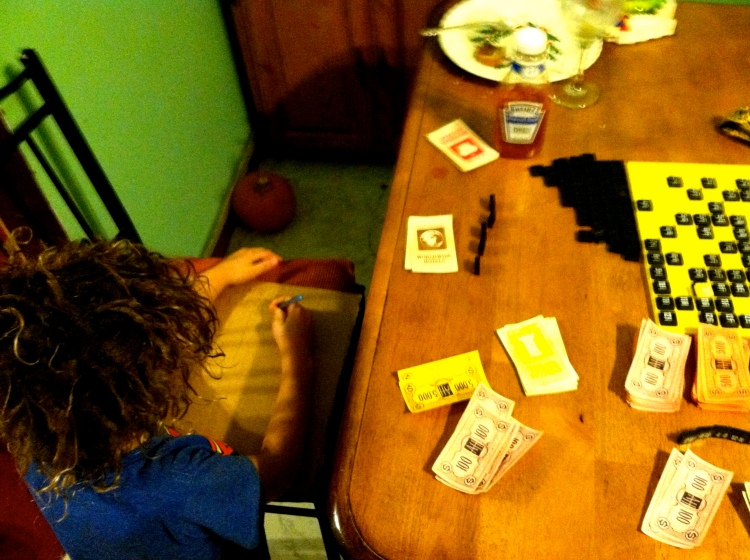This is going to be a quick post about our two favorite board games.
You can say what you like, but I have been a fan of this game since my cousin introduced me to it 20+ years ago. You can also play by Poppop’s rules to make the game go faster. His rules are that when you land on Purple property, you can then buy all the purples, thus securing the monopoly and the ability to build on them. Caleb however has rejected the short version rules, so now we play the regular way.
Things he’s learned from Monopoly:
Percentages: You take ten percent of all your money when you land on income tax, so he has gotten very proficient at managing percentages. Because, really, once you understand the concept enough to get 10%, it’s easy enough to translate that into figuring out 25% of dowels at the craft store.
Rounding: Lately we’ve taken to not using the $1’s (and then $5’s), and rounding the rents to the nearest 5 (or 10 respectively). Rounding isn’t really that difficult, but I remember plenty of boring worksheets directed to practicing this skill.
Addition of hundreds: The game didn’t teach him how to add, but it does give good practice with adding pretty large numbers.
Reading Practice: All the streets/squares are named, plus there are community chest and chance cards.
I have never met anyone outside of my dad’s side of the family that has played or even heard of this game, but it deserves mention.
Basically you play tiles on a board to create “hotels.” Once a hotel has been created, you can buy stock in the hotel. There are mergers where you get bonuses, and you can sell or trade your stock.
Caleb and I started out with this game by just putting on tiles, then I taught him about the hotels, then he learned some more rules, and so on until he was playing an entire game (although it took FOREVER, so I always had some sanding or reading to do on the side, since four/five year old’s are easily distracted). He wanted to learn how to play, because that what the grown ups around him liked doing, and he wanted to be included.
Acquire is best with 3 people, but we only have 2 of us, so we just use the same rules as for 3+ people.
Things he’s learned or practiced from Acquire:
Multiplication: You can buy up to 3 stocks at a time which range from $200 to $1200 each. So if you want three, then you practice 3 $200’s. And of course, it’s easier to think about it like 3 2’s, so he’s learning how the numbers even into the thousands relate to each other in the same ways as little numbers do. If you want to sell your stock after a merger, then you have to multiply 8 or 13 times $200 or $800.
You can also trade your stock, but you have to trade 2 for 1, so you have to determine whether you would make money on the trade.
So really there is a lot of working with numbers in general up into the ten-thousandth’s place: addition, subtraction, multiplication, a little bit of division.
Those are our 2 favorite long board games. I’ll be back tomorrow with some more games and thoughts about learning.
